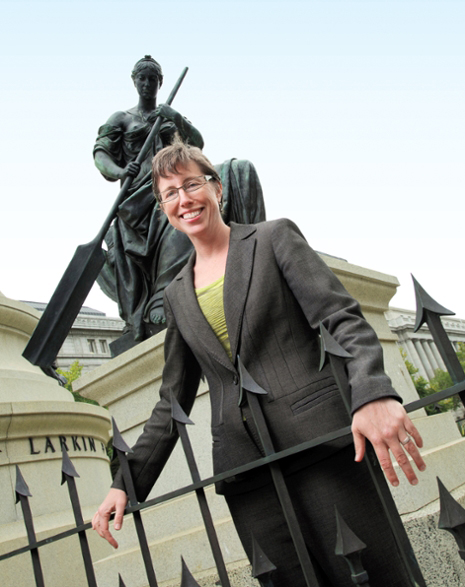Professor Elizabeth L. Hillman, a scholar and expert on sexual violence in the military, will speak Thursday, November 6, at UC Santa Cruz as part of the UC Hastings / UC Santa Cruz Social Justice Speakers Series (#UCsjss).
Her lecture, "Sworn to Protect: Sexual Assault in the Military," will begin at 7 p.m. at the Music Recital Hall on the UC Santa Cruz campus. The public is invited. The $5 admission includes parking. Tickets may be obtained at http://3plus3.ucsc.edu/sjss. A limited number of free student tickets are available at the UC Santa Cruz ticket office.
“Women in the military are more likely to be diagnosed with post-traumatic stress disorder because of rape by another service member than by combat,” says Hillman, provost and academic dean at UC Hastings College of Law. She has testified before Congress and the U.S. Commission on Civil Rights, and is assisting lawmakers drafting bills proposing significant changes in military justice.
Few legal issues have sustained the political attention and cultural currency of sexual assault in the U.S. armed forces, Hillman says. Her presentation will address controversies that have erupted over the problem itself, which is often misunderstood; best practices and prospects for improving response systems to reports of sexual assault in both civilian and military arenas; and the unique nature of the American military justice system, which has been changed more in response to sexual assault than to any other crime, social problem, or disciplinary challenge since World War II.
Some of the questions she plans to address: "Should commanders control the decision to prosecute? Should each branch of service retain its own investigators, prosecutors, defense counsel, and appellate court? What's the impact of providing legal counsel to victims throughout the criminal justice process? What outcomes demonstrate improvement in preventing a crime that is so rarely reported? How do the gender demographics of the military affect sexual assault prevalence?"
Last year, the House Armed Services Committee’s ranking minority member appointed Hillman to an independent sexual assault review panel that will recommend policy changes to the U.S. Department of Defense. She began her scholarship about military sexual assault and civil rights in 2000 as a reporter for a blue-ribbon panel convened on the 50th anniversary of the Uniform Code of Military Justice.
In addition to her academic work, Hillman serves as president of the National Institute of Military Justice and as co–legal director of the Palm Center, an independent think tank that sponsored much of the critical empirical research that led to the end of “don’t ask, don’t tell.”
She’s published two books: Military Justice Cases and Materials, with Eugene R. Fidell and Dwight H. Sullivan, and Defending America: Military Culture and the Cold War Court-Martial, and is working on a comparative study for the U.N. Office of the High Commissioner for Human Rights that will identify best practices for handling military sexual assault and harassment by examining what’s done in countries other than the United States. She’s also studying the military use of drones.
Hillman joined the Air Force ROTC to pay for college. She earned a degree in electrical engineering at Duke University before enlisting in the Air Force where she was a space operations officer and orbital analyst. After seven years, she left the military and became a scholar, earning her law degree as well as a Ph.D. in history, at Yale University.
“In general, our topics find us,” she says about choosing what to research. “I try to keep talking to people—not just scholars but veterans, legal practitioners, judges, community groups, and gay and lesbian groups. It helps me get a sense of what people are concerned about and what we need to work on.”



